You are here
Revolutionising Elderly Care
A WINNING BLEND OF INNOVATION, COMPASSION, AND BUSINESS ACUMEN
Geriatric care management is experiencing growing demand worldwide due to the increasing longevity of people. According to the World Health Organization (WHO), the pace of population ageing is now much faster than in the past. The proportion of the world's population over 60 years old is projected to nearly double from 12% to 22% between 2015 and 2050.[1]
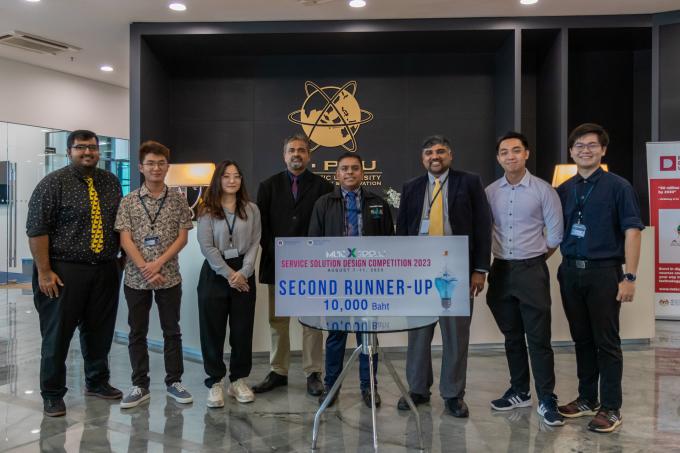 Team Delta APU was the only team representing Malaysia in Thailand’s Service Solution Design Competition 2023 and clinched second runner-up. Celebrating its achievement on campus are (L-R) Mr. Krishna, Yip Jin Xiong, Yong Shuet Li, Dr. Siva Kumar, Prof. Dr. Vinesh, Ir. Narendran, Cajun Tai Ka Joon (team lead), and Ang Jia Ze.
Team Delta APU was the only team representing Malaysia in Thailand’s Service Solution Design Competition 2023 and clinched second runner-up. Celebrating its achievement on campus are (L-R) Mr. Krishna, Yip Jin Xiong, Yong Shuet Li, Dr. Siva Kumar, Prof. Dr. Vinesh, Ir. Narendran, Cajun Tai Ka Joon (team lead), and Ang Jia Ze.
In an effort to assist a medical institution in identifying real-world solutions for preventing or reversing frailty in the elderly, Mahidol University International College (MUIC) in Thailand recently hosted the Service Solution Design Competition 2023. This competition brought together over 30 talented individuals from diverse backgrounds and countries, who were teamed up into nine teams.
[1] https://www.who.int/news-room/fact-sheets/detail/ageing-and-health
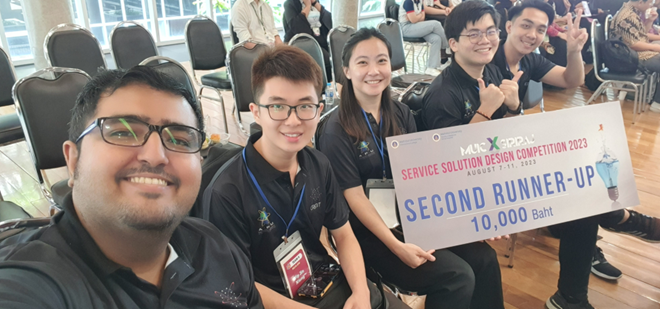
The main highlight of their competition journey in Thailand by winning second runner-up. From left - Mr. Krishna (mentor), Yip Jin Xiong, Yong Shuet Li, Ang Jia Ze, Cajun Tai Ka Joon (team lead).
Team Delta APU, representing Malaysia and hailing from the Asia Pacific University of Technology & Innovation (APU), comprised four Bachelor of Engineering in Mechatronics Engineering with Honours students: Cajun Tai Ka Joon, Ang Jia Ze, Yong Shuet Li, and Yip Jin Xiong.
The competition's goal was to devise the best service solution to enhance the physical, mental, and emotional well-being of elderly patients. Additionally, these solutions needed to incorporate a feasible business aspect, aesthetic packaging design, and promotional value.
Team Delta APU's winning solution involved developing an AI-integrated platform with a camera capable of tracking the daily activities of the elderly without requiring them to wear any additional devices. This innovation could be readily utilised by elderly senior citizens, their caregivers, and geriatricians. The team not only secured the second runner-up position with a prize of 10,000 Baht but also gained valuable insights into integrating business acumen with engineering.
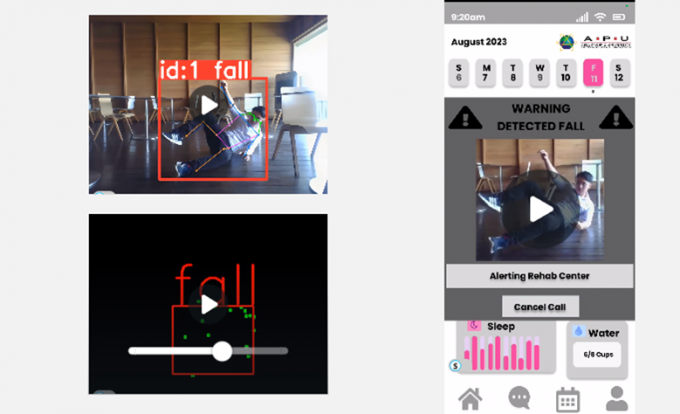
AI-integrated app developed by Team Delta APU comes with a camera and a fall detection alert feature that is capable of tracking the daily activities of the elderly.
The event spanned five days from August 7th to 11th and took place at MUIC, Thailand's first public international college located in Nakhon Pathom Province, central Thailand. Participants were accommodated on campus and had the opportunity to visit the Siriraj Academic Center of Geriatric Medicine at Siriraj Hospital and a medical technology company for real-world case studies and field observations. They also engaged in a design thinking simulation workshop and participated in the Biodesign innovation session, culminating in the pitching presentations.
"Our students were guided to rehabilitation wards and rooms for geriatric patients. They were briefed on the structure and functionalities of the patients' rooms, emphasising that the pitching competition ideas should revolve around these aspects," explained Mr. Krishna Ravinchandra, Tutor at APU's Center for Research and Development of IoT (CREDIT), who served as the team's mentor throughout the journey.
The organiser highlighted the importance of understanding the challenges faced by geriatric patients and their daily needs. Each participating team conducted interviews with elderly individuals aged between 60 and 75 years, providing valuable insights. They were also tasked with a simulation exercise, which required them to wear back braces, knee braces, ankle weights, and gloves to simulate the experience of being an elderly person.
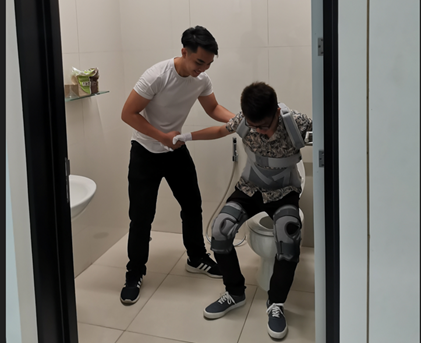
Cajun Tai Ka Joon (from left) assisting Yip Jin Xiong who wears back braces, knee braces, ankle weights, and gloves to simulate the experience of being an elderly person.
In preparation for the pitching event, a speaker was invited to provide insights into creating business models and effectively presenting them to potential investors. The talk focused on identifying commercial pain points, making products attractive and sellable, and also reminded contesters to highlight product novelties when pitching ideas to judges who played the role of investors.
Cajun Tai Ka Joon, the team lead, highlighted the competition's eye-opening nature, emphasising the importance of incorporating a business mindset into engineering. He noted that while engineers may have innovative ideas, success also hinges on effective product commercialisation and marketing.
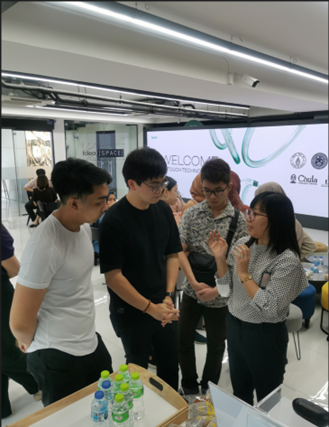
The members of Team Delta APU learning the importance of incorporating a business mindset into engineering - identifying commercial pain points, and making products attractive and sellable.
Team Delta APU's project aimed to enhance the well-being of elderly individuals through comprehensive health monitoring, user-friendly interfaces, and timely assistance during emergencies. Their innovative approach, which prioritised privacy and non-intrusiveness over wearable devices, resonated with the judging panel.
Regarding their overall achievement, Tai credited collaboration and teamwork as critical factors in their success. Each team member possessed unique skills: Ang Jia Ze excelled in hardware design, contributing to the implementation of the camera prototype; Yip Jin Xiong specialised in the business and finance aspects, shaping the marketing strategy; Yong Shuet Li demonstrated proficiency in both software development for the app design and business and finance for creating the prototype's business model. Tai himself excelled in software development.
Ir. Narendran Ramasenderan, Senior Lecturer of APU's School of Engineering (SoE) and head of CREDIT, applauded the team's achievement, he commented, “CREDIT's students demonstrate a fervent dedication to refining their engineering skills to address vital social issues. While they mastered deployment, prototyping, and field testing, the competition offered comprehensive development through immersive business planning sessions. This equipped them with a robust understanding of business dynamics, creating well-rounded professionals ready to make a meaningful impact.”


